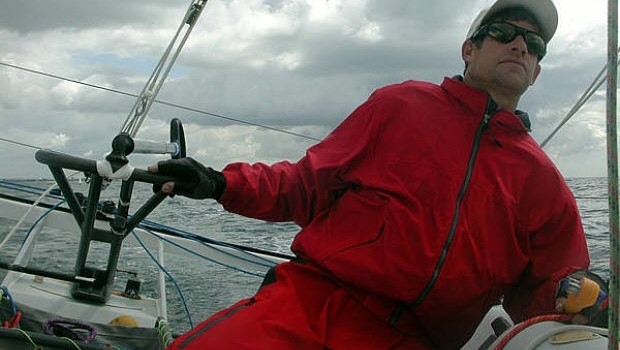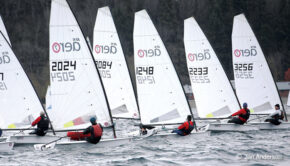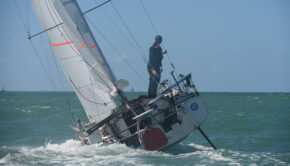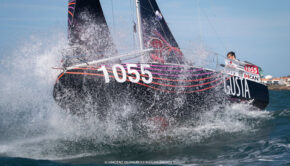Mini Transat – Jonathan McKee reflects back ten years ago
Published on November 11th, 2013
The biennial Mini Transat, a transatlantic race for solo Mini 6.5m competitors, will finally begin Tuesday.
Originally to start from Douarnenez (France) on October 13, the 84 singlehanders were postponed to October 29 due to severe weather. Once started, with the fleet nearly two-thirds across the Bay of Biscay, the race was abandoned due to excessive conditions. The fleet was diverted to Sada, at the north west tip of Spain, to wait for the restart.
The race was to have two legs: 1257 miles from France to Canary Islands, and 2764 miles from Canary Islands to Guadeloupe. But now with the delays, the race is reduced to one leg, 3700 miles across the Atlantic from Sada to Pointe a Pitre, with a gate at the Canary Islands for safety.
American Olympic medalist Jonathan McKee, who competed in the 2003 edition, reflects on his own experience with the race…
It has been excruciating watching the ongoing delays in the start of this year’s Mini Transat Race. I feel so sorry for these guys and gals. They were all geared up for a start nearly a month ago! I cannot imagine how anyone can take that much time off, essentially a month longer than originally planned! It will be interesting to see how many starters there are of the original 84.
The Mini Transat is an incredible adventure, and this year’s travails bring back a lot of memories for me. I sailed the race 10 years ago. It was one of the most satisfying experiences of my sailing career. The boats are really cool; very safe and sea-worthy and fast, despite being only 21 feet long. And they are cheap enough that most people who really try can find a way to fund a campaign.
They are also very modern sailboats, employing many cutting edge technologies from canting keels to rotating carbon wing masts. In fact the canting keel was first tried on a Mini. It is also a very pure race from a sailor’s perspective, with no routing or outside weather data once the race starts. You don’t even know where the other boats are during the race! This really changes the way you approach the race tactically. You just sail in the conditions you have and try to be smart and fast. No routing, no covering competitors, just sailing your boat to the finish line. It becomes more of an internal battle.
Looking back on my own Mini Transat race in 2003, it was ultimately a bittersweet experience. I had a good first leg, finishing second. The long leg from the Canary Islands to Brazil started out windy. I had a rough first night and got pretty far behind the top boats. But then I hit my stride in the trade winds, and had a very fortunate doldrums crossing to take a 70 mile lead into the final days. Then tragedy struck in the form of a shroud failure and subsequent dismasting when 700 miles off the coast of Brazil (3 or the top 4 boats broke their masts that year).
So now I had to sail under jury rig to Recife (Brazil), then transport the boat overland to the finish in Salvador. That turned out to be more challenging than anything at sea! Despite all that, I still look back with great fondness on my Mini days. I think I became a better sailor and seaman, and I became comfortable by myself in the middle of the ocean for weeks on end. Not sure that is a good thing, but anyways I have no regrets.
Now I am watching the current race unfold with great interest. I feel really bad for the sacrifices everyone has made, but in the end those that persevere will have a great story to tell, and an adventure they will never forget.








 We’ll keep your information safe.
We’ll keep your information safe.